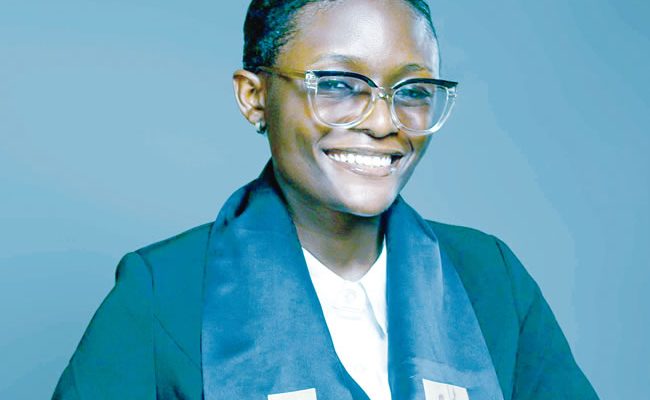Alvina Amobi graduated with a First Class from the Faculty of Law, University of Nigeria (UNN) in the 2022-2023 session with a Cumulative Grade Point Average (CGPA) of 4.62 on a scale of 5. In this interview by Kingsley Alumona, she speaks about her academic journey and other issues.
At what point in your life did you realise you wanted to be a lawyer?
I have always aspired to be a lawyer. There was never a doubt. I would say that what changed was my reason for wanting to be a part of the legal profession. Initially, I was attracted to the wig and gown as a kid. Quite funny, when faced with an opportunity to imitate what I wanted to be in the future, it was a thing of joy for me to dress like a lawyer. With time, I was presented with leadership roles like being the President of the Literary and Debating Society in my secondary school — St. Margaret Comprehensive College, Lagos. This made me participate in and lead debate competitions. During that period, I learned the word “Advocacy” and was always commended for displaying it. I further learned that it was a necessary skill for lawyers. My interest began to make more sense. I became aware of other interesting facts about the law that heightened my interest, including that I could make a lot of money as a stellar lawyer, be a convener of justice to people, and so on. Overall, although my reasons varied, my interest was never in doubt.

How would you describe the kind of education you had at the University of Nigeria (UNN)?
While I am grateful for studying Law, I am more grateful for doing that at the University of Nigeria (UNN). This does not say that I had a 100 per cent smooth ride. Of course, studying Law at a Nigerian federal university had its ups and downs, but the advantages I derived were more. I was taught by some of the finest minds in different fields of Law. So, I can say that my expectation of quality education as regards dispensing knowledge was met. However, in my humble opinion, innovation was quite a challenge for the institution at large. The downside of this was evident during the COVID-19 lockdown, General Studies (GS) computer-based examinations, publication of academic results, course registrations, and so on.

Regardless, and most importantly, it takes a community to learn. The community I made at UNN contributed to my general success. If I should go back and attend a federal university, knowing what I know now, I would choose to study Law at UNN again.

What aspects of law interest you more and why?
I have a keen interest in taxation, commercial law, and finance. In my third year, I emerged overall best in commercial law and that was a validation of the efforts I had put into being a scholar of my interests. I studied the law of taxation as an elective course at 400 level. I also wrote my undergraduate long essay on a tax-based issue. Notwithstanding, as I await law school, I am keeping an open mind to what the future holds for me.
In your LinkedIn post you mentioned that in your 200 and 400 levels, you had a perfect grade point average (GPA) of 5.0. So, what prevented you from making a 5.00 GPA in your other levels?
My first journey in school was that of discovering myself and what works for me academically. In the process, I made some mistakes and found myself floating at some point. For example, I was a night-class reader in year one. Although I put in so much effort while at it, my results did not reflect that. The good thing is that I never lost my optimism and drive. I saw academic disappointments as a motivation to do more. I sought guidance from senior colleagues, discovered my peculiar techniques, and was always conscious of my priorities in school. Put in a better way, my foundational lapses did not prevent me from getting perfect grades. Rather, it afforded me the mindset to see my possibilities clearly and reach for them.
What was the title of your final-year project and what were the major findings from it?
For my undergraduate long essay, I wrote about ‘Tax incentives, infrastructure financing, and the attainment of Sustainable Development Goal 9 in Nigeria’ and received a distinction for its relevance, depth of research, and feasibility.
For context, SDG 9 aims to build ‘resilient infrastructure, promote sustainable industrialisation, and foster innovation’. Here, I found that with better investment in Nigeria’s tax incentive regime and infrastructure, we would achieve the three arms of SDG 9 which constitute the heart of the economy. Amongst other recommendations, streamlining the scope of Nigeria’s sector-specific incentive schemes, particularly for innovative research and development (R&D) in the manufacturing sector, and alignment with global best practices will yield positive results for Nigeria’s economy.
One of your leadership endeavours in the university included being the president of the UNN Students’ Bar Association (SBA). What were your roles as the president of UNSBA and what legacy did you leave behind in the association?
Being elected as the second female president of the association came with a lot of expectations, especially from me. As the UNSBA president and senior advocate of the University of Nigeria (SAUN), I was the chairperson of the UNSBA Supreme Council and an ad hoc member of every standing and specific committee of the association. I was in charge of organising and supervising moot and mock trial competitions; enrolling for external competitions; training members of the students’ bar association in the area of legal research, drafting, and advocacy; planning the annual UNSBA summit and call to bar conference, and representing the association’s interest before the UNN law faculty administration.
One significant legacy I am grateful for was keeping the association on a progressive course, regardless of the unusual academic hurtle. Also, an Honourable Justice of the Enugu State High Court (Hon. J. Okey P. Anike) and some seasoned law lecturers presided over competitions as opposed to only student judges. This made the process more practical and encouraged learning.
In your LinkedIn post, you said that as the UNSBA president, you led a team to Kenya to deliver a presentation on social inclusion and sustainable development. What were the major highlights of the presentation?
That is correct. With the help of some lecturers and the faculty administration, a team of eight attended the Konrad Adenauer Stiftung Rule of Law Programme at Kenyatta University and ALN Nairobi, Kenya. We — student representatives from Nigeria, South Africa, and Kenya — had a comparative discussion on various themes bordering on land matters, access to identity documents, homelessness, abuse of police powers, and climate justice.
The experience was fascinating. It revealed that, regardless of our differences in Africa, most of our nation-threatening issues are regional.
You held many leadership positions at your faculty and the university, including those you held at the church and the Students’ Union Government (SUG) levels. How did you manage to juggle these extracurricular activities with your academics and still graduate with a First Class?
Every human is unique. The best template is to figure out what works for you. As regards extracurriculars, finding a balance can be hard. But with your priorities set straight, you will successfully navigate the process. Always be aware that you are in school for your academics before anything else. Keep the right company, control distractions, and always hold on to God. In summary, that was my formula.
A country is as good or bad as its legal system. As someone familiar with the Nigerian legal system, if you were to recommend three things that would strengthen the Nigerian legal system that would help make the country a better place than it currently is now, what would they be?
First, a review of some obsolete applicable laws is necessary. There is a need to fine-tune our legal corpus in line with the contemporary needs of Nigerian society, innovation, and global best practices. Secondly, there should be secured judicial independence to eradicate abuse of power. The dependence of the judiciary and legislative arm of government on the executive makes the government high-handed and robs Nigerians of fairness and the true dividend of democracy. Finally, the lack of policy implementation is a huge problem. Governmental institutions should be adequately financed, staff should be trained periodically, and necessary supervision carried out to monitor progress.
After law school, every fresh lawyer has a vision and dreams of what they want to do with their law training. What is the unique thing you want to do with your legal training and why?
I intend to practice for a while before furthering my education. I also intend to major in the expected end God wills for me. I know that I will do great things in (and for) my career, and I am happily looking forward to that.
What were the things or situations you think your university could improve on to make life and schooling comfortable for students?
Again, studying at a federal university comes with a lot of challenges. In addition to the lapses earlier discussed, I will mention just one thing — poor hostel conditions. While it is not compulsory to live in the school hostels, it is usually the go-to option since external lodges are expensive. To a great extent, one’s learning environment influences learning. I believe that improving the state of hostels in UNN would make schooling more comfortable for students.
What is your advice to students who are aspiring to achieve the kind of academic feat you achieved?
Remain your most authentic self. Positivity is your fuel to achieve anything. Stellar action drives excellence. Never lose those qualities. Read tirelessly, pray fervently, and build a community or friendship of like-minded people. Discover your peculiarities and never lose sight of your priorities. Above all, be resilient.
READ ALSO: Group wants Gov Mutfwang to rescind suspension of traditional ruler








